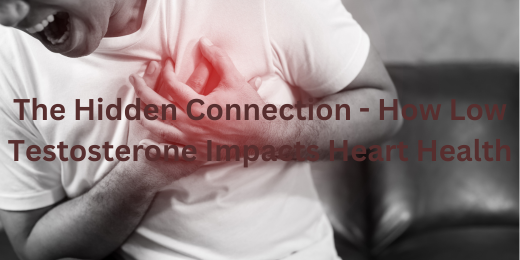
The Hidden Connection – How Low Testosterone Impacts Heart Health
Low testosterone and heart health
The Study: Low Testosterone, Shorter Lifespan?
A recent study has highlighted the connection between low testosterone and heart health. Researchers analysed data from over 24,000 men across 11 studies, revealing that low testosterone levels can significantly increase the risk of death from all causes. This underscores the importance of maintaining healthy testosterone levels. This blog post is inspired by research presented in the Medical News Today article.
The research, which involved collaboration between scientists from the University of Western Australia, North America, and Europe, found that testosterone deficiency is linked to a higher risk of cardiovascular death. The study provides clarity on previous inconsistent findings, showing that very low testosterone levels particularly elevate cardiovascular risks.
For men, understanding this connection is crucial. Managing cardiovascular risk associated with low testosterone involves recognising symptoms of deficiency and seeking appropriate medical advice. Natural methods to boost testosterone include regular exercise, a healthy diet, and adequate sleep, which can collectively enhance overall heart health.
Low Testosterone and Heart Health
The study found a significant link between low testosterone and heart health, showing that men with very low testosterone levels have a higher risk of cardiovascular death. This highlights the importance of heart health, especially for South Indian men, who face a high prevalence of heart disease.
Researchers examined prospective cohort studies, focusing on community-dwelling men with measured total testosterone concentrations. They used mass spectrometry for accurate results and followed up for at least five years. This approach helped them understand the relationship between testosterone deficiency and cardiovascular risk.
By analysing individual patient data, the team assessed baseline hormone concentrations, including total testosterone and sex hormone-binding globulin. Their findings underscore the critical association between low testosterone and increased cardiovascular risk, leading to higher rates of cardiovascular events and deaths from all causes.

Understanding Testosterone Levels
The study used a highly accurate method, mass spectrometry, to measure testosterone levels. It found that men with testosterone levels below 7.4 nmol/L had a higher risk of mortality. This highlights the critical link between low testosterone and heart health.
Researchers identified that testosterone deficiency significantly impacts overall health. They noted that men with testosterone levels below 5.3 nmol/L faced a heightened risk of cardiovascular death. This discovery underscores the importance of maintaining healthy testosterone levels for longevity and heart health.
Understanding these findings is vital as they reveal a clear connection between low testosterone levels and increased cardiovascular risk. This data emphasises the need for regular health checks to monitor testosterone levels and manage associated health risks effectively.
Why Low Testosterone Might Be a Problem
Testosterone deficiency poses concerns for men’s heart health. Dr. Yu-Ming Ni, a cardiologist, highlights uncertainties about its link to cardiovascular risk. Factors like obesity, liver problems, and medication side effects contribute to low testosterone levels, raising questions about its implications for men’s cardiovascular health.
Understanding the association between low testosterone and heart health requires further research. Dr. Ni emphasizes the need for clarity on underlying causes. South Indian men, like others globally, face potential risks associated with hormonal imbalances, necessitating a holistic approach to health management beyond solely addressing testosterone deficiency.
Addressing cardiovascular risk in men involves comprehensive strategies. Exploring the interplay between low testosterone and heart health is crucial for tailored interventions. While the study does not offer definitive conclusions, it underscores the importance of considering various factors influencing testosterone levels and cardiovascular outcomes in clinical practice.
Testosterone Replacement Therapy: Proceed with Caution
Testosterone replacement therapy is a subject of debate among medical experts. Dr. Ni highlights a study suggesting no significant association between testosterone deficiency treatment and heart disease rates. Further research is needed to clarify the relationship between low testosterone and heart health.
Dr. Ramin emphasizes the multifaceted role of testosterone beyond sexual function. While testosterone deficiency affects libido and erectile function, its impact on cardiovascular risk remains uncertain. Patients should weigh the potential risks and benefits of testosterone replacement therapy under medical guidance.
Before opting for testosterone supplements, individuals should seek professional advice. The study’s findings underscore the importance of informed decision-making regarding cardiovascular risk and hormone therapy. Consulting with healthcare providers helps navigate complexities associated with testosterone deficiency treatment.
Natural Ways to Manage Testosterone Levels
Managing testosterone deficiency naturally involves lifestyle modifications. Dr. Ramin highlights the diverse effects of low testosterone, including bone density loss and mood changes. Natural methods like maintaining a healthy weight and quality sleep can help regulate testosterone levels and mitigate cardiovascular risk.
Regular exercise, particularly cardiovascular activities, plays a vital role in testosterone management. Dr. Ramin advises on specific lifestyle adjustments such as limiting alcohol intake and increasing water consumption. Additionally, incorporating certain nutrients like vitamin D3 can support testosterone production while avoiding supplements containing estrogenic compounds.
Supplementation with DHEA under medical supervision may benefit men with low testosterone. However, caution is necessary to monitor for potential adverse effects, especially in individuals at risk of prostate cancer. Overall, adopting a holistic approach to testosterone health through lifestyle and dietary changes can positively impact overall well-being.
Remember: Please note that this information is provided for educational purposes exclusively. It is essential to seek guidance from a qualified healthcare professional for personalised advice on maintaining optimal testosterone levels and overall health.